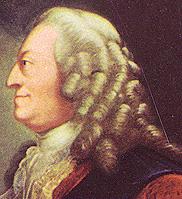King George II of Great Britain
From the Quicksilver Metaweb.
Stephensonia
What's pertinent to the The Baroque Cycle is his wife Caroline corresponded often with Gottfried Wilhelm von Leibniz and that she sent Enoch Root to Boston to get Daniel Waterhouse to sue for peace between her friend and Isaac Newton.
Authored entries
none yet
George II of Great Britain
From Wikipedia, the free encyclopedia.
King George II (November 10, 1683 - October 25, 1760 - reigned June 11, 1727 - October 25, 1760) was the second Hanoverian king of Great Britain; previously he was the Prince of Wales.
George Augustus was the son of George Louis, heir-apparent to the electorate of Hanover. He was born at Schloss Herrenhausen, Hanover, and was christened George Augustus. He arrived in Britain as Prince of Wales in 1714, when his father acceded to the throne on the death of Queen Anne, as George I of Great Britain. The prince was by this time a man of thirty, and had been married for several years to Caroline of Ansbach with whom he had three sons and five daughters.:
George II
King of Great Britain, Ireland
Elector of Hanover
- Frederick, Prince of Wales - (February 1, 1707 - March 31, 1751).
- Anne - (November 2, 1709 - January 12, 1759).
- Amelia Sophia Eleanor - (July 10, 1711 - October 31, 1746).
- Caroline Elizabeth - (June 21, 1713 - December 28, 1757).
- George William - (November 13, 1717 - February 17, 1718).
- William Augustus, Duke of Cumberland - (April 26, 1721 - October 31, 1765).
- Mary - (March 5, 1723 - January 14, 1772).
- Louisa, later Queen consort of Denmark and Norway - (December 18, 1724 - December 19, 1751).
George had a poor relationship with his father, and his own eldest son, Frederick, Prince of Wales, would have an equally bad relationship with him. After the death of George I, it was discovered that he had planned to send his eldest son into exile in the colonies.
George was neither cultured nor intelligent, but his wife, Caroline, was both. She exercised political influence by her friendship with the prime minister, Robert Walpole, even after a quarrel with the king which resulted in the Prince and Princess of Wales - as they then were - being thrown out of their royal apartments. He was a plain, blunt man; of an ingenuous disposition, but hasty, obstinate, and parsimonious; and wholly regardless of science or literature. Still he was not unpopular; and dying in the midst of a successful war, the blaze of national glory would have been strong enough to eclipse his personal defects, had they even been more glaring. She was also Regent whenever George was on one of his frequent visits abroad in Hanover. They held a rival court at their home in Leicester House.
George II succeeded to the throne on his father's death in 1727, but a battle of wills continued with his son and heir, Frederick, Prince of Wales, ending only with Frederick's untimely death in 1751. Frederick's eldest son, the future George III, was thereupon created Prince of Wales and heir apparent. However, young George's mother, Augusta of Saxe-Gotha, mistrusted her father-in-law and did her best to keep them apart.
George II is remembered as the last King of Britain to lead his own troops onto the battlefield, which he did at the Battle of Dettingen. He was accompanied in this exploit by his military-minded younger son, William Augustus, Duke of Cumberland.
The most important event of George's reign, however, was the Jacobite Rebellion of 1745, which almost resulted in his overthrow by the Stuart claimant to the throne and culminated in the Battle of Culloden (1746), the last battle to be fought on British soil. The Duke of Cumberland, entrusted with command on his father's behalf, defeated the army of Bonnie Prince Charlie, effectively putting an end to the Jacobite resistance.
George II, despite being happily married, always had an interest in other women, and kept many mistresses. On the premature death of his wife, Queen Caroline, in 1737, he was distraught. When she reputedly told him, on her deathbed, that he should re-marry, he famously replied, "Non, j'aurai des maitresses" ("No, I will have mistresses")! He died on October 25, 1760 from a stroke suffered while sitting in his toilet and was buried at Westminster Abbey.
He was succeeded by his grandson, George III of the United Kingdom.
Related Entries
- James II
- Queen Anne
- Queen Caroline
- Isaac Newton dies before George II takes the throne
- Gottfried Wilhelm von Leibniz
- Daniel Waterhouse
- George I of England
External Links
- Charles Edward Stuart Bonnie Prince Charlie
